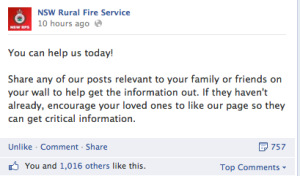Following from an earlier post where I saw Geoffrey Robertson QC present, one comment he made has stuck with me ‘the greatest value of any civilised society, is the extent to which it cares for its most vulnerable members’.
When you see a homeless person, do you stop to buy them a coffee or email a charity to ensure their social workers and vans know about it? Because lets face it we aren’t all entirely convinced where those coins are going to be spent… When I lived in London I recall gypsies begging with a baby outside work when it was snowing. I rang the police (standard!) who said they couldn’t do anything. I reminded them that in Australia a baby would be protected by our authorities from the icy winter streets. As Geoffrey Robertson says ‘Australians have a distinctive moral outlook and are possibly the best example in the world of the reformation of the human spirit’.
We have all witnessed the terrifying bushfires raging throughout New South Wales at the moment – this news broadcast is a stark reminder of the raging inferno many communities are engulfed in with the emergency services doing their best to contain the flames.
The Rural Fire Service is instrumental in leading the disaster response on the front line and via social media. With a recent post declaring people ‘Prepare for the emotional, mental and physical impact of defending your property, if in doubt, leave’. The threat of large loss of property and life is very real and its up to the rest of us as a community to stand up and act to support our most vulnerable citizens.
Imagine if your family, friends, pets, home or neighbours were at risk? But can we imagine that enough to act? Or are we planning our next manicure, restaurant reservation and pub crawl. Have you considered?
- Donating cash for those managing the disaster response
- Donating clothes (apparently household items are too impractical for the RFS to accept – fair enough!)
- Donating food for victims and for the emergency services (cooking would be a bonus I’m sure)
- Providing accommodation for people who’s homes have been burned to a cinder
- Supporting bushfire victims and our firies through this challenging time
- Volunteering e.g. for the RFS front line, admin, washing uniforms, anything! If not to enable immediate help in the future the more manpower the better. So pleased to report our fellow firies in NZ have confirmed they can assist.
- Driving awareness of important messages from RFS and beyond – such as the Facebook message for anyone in the bushfire stricken area to empty their green garbage bins, fill with water and leave with a sign and also those with a pool. It is evident social media has proven a positive influence in the work of disaster response teams with its ubiquitous nature.
- Fundraising for anyone you know personally that has been affected, or for the overall disaster response.
- Preparing your own house so its fire ready
- Educating your loved ones about what to do in case of a bushfire
- Lobbying Government for relief measures and stronger policies as well as increased resourcing for disaster relief
And the list goes on…
The point is we as a community have a moral obligation to support our fellow countrymen. There are so many things you can do to act as I have listed, even as creative as driving nearby with chilled bottles of water for the emergency services!
To quote again from my Dalai Lama post, we must always treat the entire population as one. If there are members of society that are more vulnerable than others its up to us to support them. The favour will always be returned and at some point in our lives we will too be vulnerable members of society. If the emergency services or the military thought it was all too hard to put their lives at risk to help others than where would we be? We can all play a role.
I just registered as a volunteer for the RFS – I doubt I will be any use front line but I am prepared to help with whatever else!




